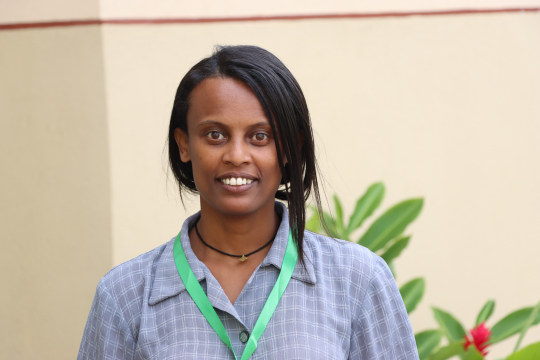Hana Mekonnen Alemu is one of Ethiopia's 2023/24 IGE Fellows. She works as a Climate Change Expert at the Ministry of Water and Energy. The Ethiopian team worked with two Transition Initiatives (TIs) as part of the program. One is about tax incentives for increasing access to clean cooking technologies and the other is about enhancing access to financing to reduce biomass dependency. Both initiatives are aimed at the private sector. Meet Hana Mekonnen Alemu and hear her reflections on her participation in the IGE program!
Why did you want to join the IGE program?
I had heard about it from previous IGE Fellows that it’s a good learning platform and a great network to be part of. I definitely need this kind of platform.
What are the biggest challenges in Ethiopia when it comes to implementing inclusive green policies in general and for clean cooking in particular?
There are many! One big challenge is affordability. Clean technology is expensive, especially for people in rural communities. There is also the technology design: it is often not tailored to the needs. Donors sometimes dump technological solutions that don’t fit, such as providing improved cookstoves that don’t work with porridge pots. Then there are cultural preferences, people feel that it tastes better when you cook with charcoal or wood, for instance, coffee, and many are afraid of LPG and electricity. On the government side, there are currently no political commitments or a specific organization for this transition.
How does the IGE program fit in with your daily work? What has been useful for you?
There is a knowledge gap on how to implement green economy policies. This gap can be filled through such a learning platform. When we go back, we share our knowledge with our colleagues, other managers, decision-makers, and organizations. After we have finalized our Transition Initiatives we will present them to higher civil servants and hopefully, we can mitigate the challenges we face with green policies. We have learned a lot from the other countries in the program. Not everything is applicable because the context differs between countries, and you have to customize your policies. But a lot of what we have learned has been very valuable and really related to our daily work.
Is there something that can be improved about the program?
As we have identified, there is a lack of political commitment, so it would be good to include political decision-makers in the program somehow.
What is your main reflection after meeting the IGE Fellows from the other four countries?
They are eager to make a change. They want to ensure that the rural communities are also part of the green development. There is a growing awareness, and a wish to change the traditional perceptions.
By: Petra Hansson.
